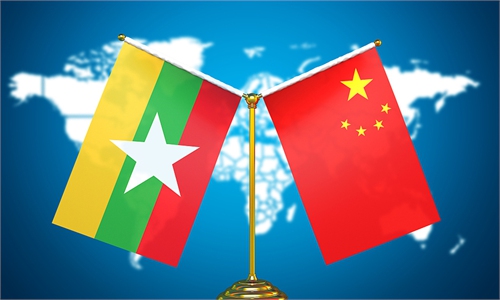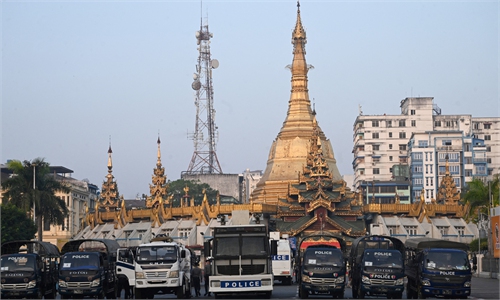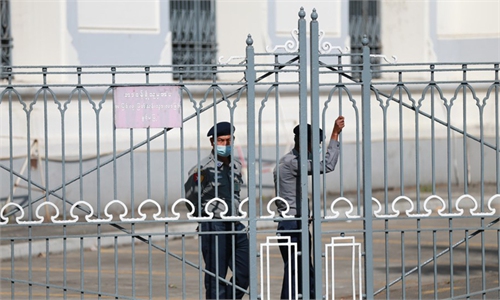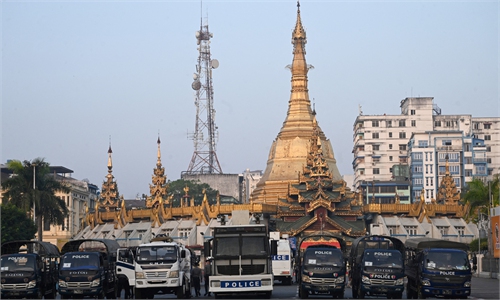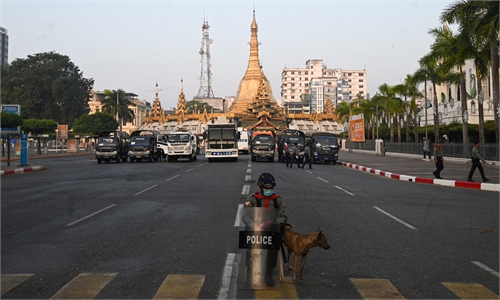GT investigates: Western forces, HK secessionists behind China rumors in Myanmar
China could use multilateral mechanism to stabilize Myanmar
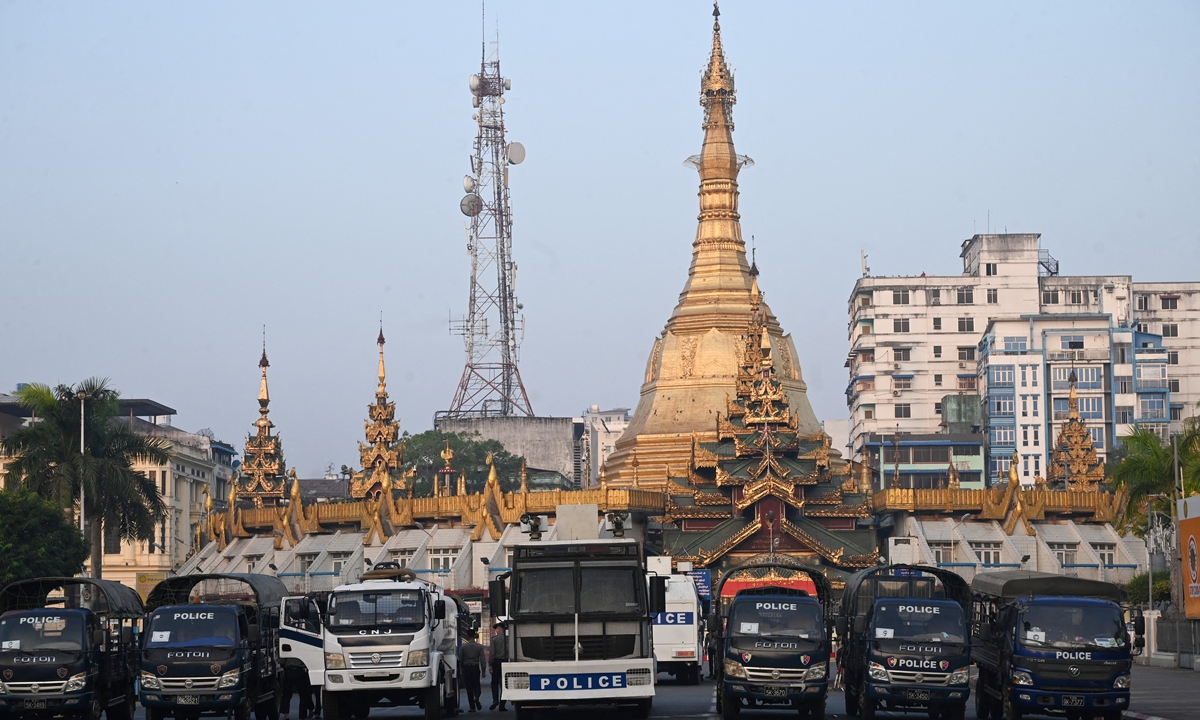
Police vehicles barricade a road outside Sule Pagoda, next to Yangon City Hall in Yangon, Myanmar on February 16. Photo: AFP
The West's campaign to put pressure on and intervene in Myanmar's domestic affairs further escalated after the UK and Canada imposed targeted sanctions on Myanmar's generals on Thursday following the US, while India joined other US "Quad" allies to point fingers at Naypyidaw.Experts warned these countries on Friday that they should not treat Myanmar as their "pawn" in geopolitical rivalry, which would not do the country good, but could risk dragging it further down into the abyss.
For a long time, the West and some anti-China forces have been trying to make use of Myanmar as a strategic pivot to contain China. Amid the political upheaval in Myanmar this time, a flurry of rumors attacking China, including the so-called "Chinese aircraft transporting technicians to Myanmar" and "China helping Myanmar building an internet firewall," surfaced on social media, stoking hatred and anti-China sentiments among the Myanmar public.
Chinese and Myanmese experts told the Global Times on Friday that some hostile forces - both in and outside of Myanmar - are deliberately making use of this opportunity to spread rumors against China and stoke hatred to distance Myanmar from China, Myanmar's largest trading partner and close neighbor.
On Monday, Chinese Ambassador to Myanmar Chen Hai dismissed these rumors in an interview with local media, stressing that they are "ridiculous" accusations.
"These rumors are totally inconsistent and malicious. We hope such rumors will not recur. If so, it only proves the manipulation and instigation of forces with ulterior motives behind the scenes," Chen said.
While Chen dismissed the rumors, they still cropped up. Several experts reached by the Global Times said Western forces are making use of the current sentiments to spread rumors through Hong Kong secessionists and local NGOs, while inside Myanmar, the misunderstanding among some people toward China are being manipulated by radical groups.
"Given the current situation, they won't easily give up but will keep fanning the flames, which needs a high alert," Li Haidong, a professor at the Institute of International Relations of China Foreign Affairs University, told the Global Times on Friday. He noted that their aim is to contain China and undermine China's influence in the region.
Aye Maung Kyaw, a Myanmar political analyst, on Friday slammed the sanctions imposed by the West in an interview with the Global Times, saying the sanctions are "stupid" to Myanmar people. He said the sanctions may only cause "mental harm" to people, who have already economically suffered a lot during the COVID-19 pandemic.
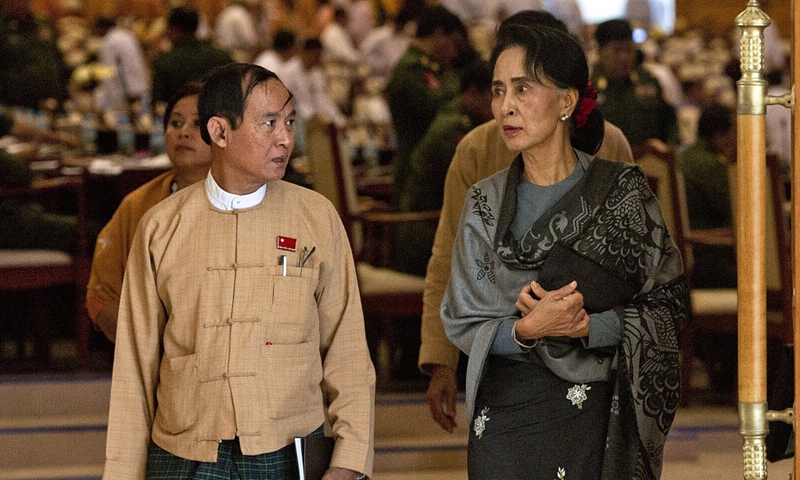
Myanmar State Counselor Aung San Suu Kyi and President U Win Myint. File photo: VCG
Three forces behind China rumors
Absconding Hong Kong secessionist Nathan Law who fled to the UK has been busy spreading rumors about China in the past weeks, posting on Facebook and Twitter, touting fake information, including China sending technical staff to Myanmar.
Law also called on his "friends from Milk Tea Alliance" to show "concern" for what happens in Myanmar. Another infamous Hong Kong secessionist, Joshua Wong, who is in jail, was once also a supporter of the Milk Tea Alliance, a loose online coalition of people mostly from regions including Hong Kong and Taiwan, who like to attack China on social media.
This time, they accused China of supporting what they called the "coup" in Myanmar.
The Milk Tea Alliance and Hong Kong secessionists are "typical mouths raised by the West. They would not give up any opportunity to attack China," Zhuang Guotu, head of Xiamen University's Southeast Asian Studies Center, told the Global Times.
"But they are just some clowns for attention," Zhuang said. He noted that it is more worthy to notice some people in Myanmar have been affected with anti-China sentiments by Western forces.
Analysts said that another force which needs special attention is local organizations that have long been cultivated by the West. They noted that the infiltration of "external anti-China forces" in Myanmar is obvious.
Westerners in recent years have cultivated some radical "democratic fighters" inside the country, and sponsored the establishment of various NGOs and think tanks that keep attacking China with bias and misinformation, analysts said.
One of them is the Institute for Strategy and Policy - Myanmar (ISP Myanmar), a self-proclaimed "independent, non-partisan" think tank based in Yangon, according to Chinese scholars Zhou Feng and Tang Dexin who named the NGO in an article.
At the end of December 2020, two months ahead of the cabinet reshuffle, ISP Myanmar released a "research report" analyzing foreign countries' roles in Myanmar. In the report titled International Actors in Myanmar's Peace Process, the organization groundlessly claimed that China "is very keen to maintain its exclusive influence over the local political and military situation" in regions such as Kachin State, while flattering the US for "supporting a peaceful, prosperous, and democratic Myanmar that respects the human rights of all its people," the Global Times found.
ISP Myanmar is more like a mouthpiece of Western forces rather than an independent, objective institute. According to its website, several US and European foundations, including the notorious US government-backed National Endowment for Democracy (NED), are its donors.
Justice for Myanmar another NGO in Myanmar, said in an earlier report that five Chinese companies have provided munitions to Myanmar and are its major supporter. Such a report was later interpreted by several overseas anti-China media as "evidence of China's support for the junta."
Fan Hongwei, director of the Center for Southeast Asia Studies at Xiamen University, told the Global Times that Myanmar has military cooperation with many countries, including Russia, Ukraine, China and India. In the current upheaval in Myanmar, China's military cooperation with Myanmar was interpreted as China's support for the military coup, which is an "imposed crime," Fan said.
"There are a lot of civil society groups in Myanmar, with many accepting funding and training from the West. It is not a secret," Fan said.
"Western countries want a Myanmar that is pro-West and keeps its distance with China, no matter the military government or Aung San Suu Kyi, or other administrations," Zhuang said.
"These [US] foundations often give money to Myanmar domestic organizations - maybe $100,000 or $200,000 each time," said a scholar from Myanmar who preferred to remain anonymous. "The foundations are likely to utilize the organizations they sponsor to do some false propaganda, like what they might have done in Hong Kong."
Inside Myanmar, Aye Maung Kyaw said there are some local people, especially a few youngsters influenced by social media, who don't like China. "They used to think that the exchanges and engagements between the two countries lacked transparency," he said.
But this negative sentiment toward China has been diminishing in the past five years, as "people have seen more transparency in relationships between Myanmar and its neighboring countries, especially China," Aye Maung Kyaw noted.
Many people have also seen China's positive role in Myanmar's economic development, he added.
China has long been Myanmar's largest trading partner and important source of foreign investment. From January to September in 2019, the value of newly contracted Chinese projects in Myanmar reached $4.77 billion, a year-on-year jump of 238.1 percent. The economic cooperation has brought tangible benefits to the local people.
However, searching on social media, reports from some radical groups and certain Western media outlets tarnishing China's relations with Myanmar and falsely claiming China had role in the cabinet reshuffle are not scarce.
Given China's good relations with the military when it ruled the country in the past, some Myanmar people were confused when the fake reports came out. So, selling these fake information has markets, analysts said.
A local resident surnamed Zhang, who was born in Myanmar and now lives in the northern region of Myanmar, told the Global Times on Friday that he had noticed most rumors targeting China came from the internet.
"Many people who saw these rumors with strong feelings are likely to buy it. Some of my friends even thought they were truth at the beginning. I explained to them and they now realize that they are fake," Zhang said.
He said that as many regions in Myanmar are underdeveloped, many people have not had the opportunity to know about every city in the country, let alone international politics. They cannot think well enough when people with ulterior motives show them fake news and photos.
But the efforts to debunk lies are useful, he said. To clarify the rumors that continue to prop up, the Chinese Embassy in Myanmar continued to update the truth.
Good relations expected
Since the democratic transition in Myanmar, Myanmar-China relations are generally good and positive, although it remains unclear whether the cabinet reshuffle will affect the relations, Aye Maung Kyaw said. "It depends on how Myanmar deals with the 'coup,' and how China will reacts to it," he told the Global Times.
Given the current situation in Myanmar, Li said that China could resort to the multilateralism mechanism, including the UN and the ASEAN, to facilitate dialogue and help bring Myanmar to stability.
"The main role of China is to serve as a bridge to help weaken the unhealthy elements in Myanmar through bilateral or multilateral coordination," Li said, adding that China should help strengthen the role of the UN in resolving Myanmar's affairs.
Earlier this month, China joined the statement of the United Nations Security Council that called for the release of Myanmar's leaders. China also supports the mediation efforts by ASEAN and the Special Envoy of the UN Secretary-General on Myanmar.
Zhang said that as an ethnic Chinese in Myanmar, he hopes the two countries can maintain good relations.
"Our fates are interlinked. It is necessary to promote mutual recognition, understanding and support. China and Myanmar are interdependent. When the two countries prosper, it will be to each other's benefit."
